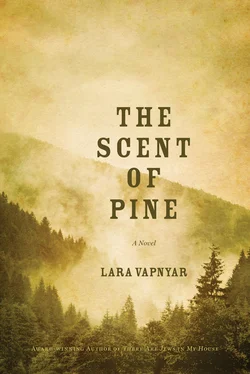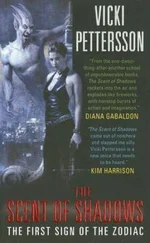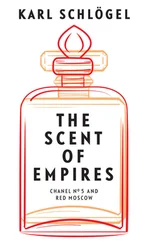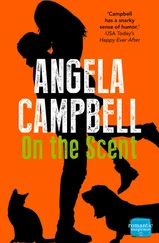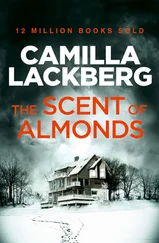“I thought that Kostik must have noticed it too.
“He cleared his throat and asked if I lived in Moscow. I said yes. He asked if I’d lived there all my life. I said yes. He said that he was from a small town on the Volga and that big cities like Moscow frightened him. I said that the neighborhood where I lived was on the outskirts of Moscow and looked more like countryside than a city. I said that there were cherry and apple trees. He said that his hometown was overgrown with apple trees, and in the summer everything smelled like apples.
“I smiled, and shivered, and moved closer to Kostik. I thought he might kiss me, but he moved away looking strangely tortured.
“There was a long line at the phone booth. Camp personnel and counselors calling home to check on their families. The women stood shivering in the night cold, swatting at the mosquitoes, shifting from one foot to the other, usually too cranky to chat. They would roll their eyes whenever somebody was on the phone too long, and sometimes even tap on the glass. Natasha, the camp nurse, talked the longest. I was sure that she was on the phone with her lover. She was completely engrossed in her conversation, and her tone and expression would change from weepy to elated and back. And every time somebody impatiently tapped on the glass, Natasha, usually so meek and considerate, gave the tapper a fierce, almost threatening, glare. She may have looked like a rabbit with bad skin to Inka, but to her mysterious lover, she must have seemed beautiful. For some reason, watching Natasha talk on the phone filled me with an almost unbearable longing to be in love.”
Lena stole another glance in Ben’s direction. She wondered if Ben could understand that. But he just sat there silently, concentrating on the road.
“When it was finally my turn to talk on the phone, Kostik stepped away from the booth. I thought he was being polite, but then I noticed that he had a particularly tortured expression. I wanted to ask what was wrong with him, but other people in line yelled at me to hurry up, and I went into the booth.
“The call took me about ten minutes—my grandfather wouldn’t be satisfied without giving me a detailed description of all the presents he got. ‘That shirt can’t be cheap, right?’ ‘Grandpa, I can’t really talk now, there is a line of people.’ ‘Uh-huh, and what about that radio your mother gave me? Sixty rubles—no less!’
“By the time I hung up, my left ear was all red and throbbing. I thought the two women that had been in line behind me would be livid. But there wasn’t anybody. The women must have left. Kostik wasn’t there either. I looked behind the booth. I called his name, peering in the dark, listening for the sounds of his steps, then looked around and called his name again and again.
“I walked up to the headquarters and knocked. Yanina’s aunt shuffled toward the door. I asked her if she’d seen a soldier walk in. She said no. I asked her if she was alone. She said that Major Vedeneev was still there, ‘Working, as always,’ she added with reverence in her voice. I thanked her and headed back. It was completely dark, except for the sharp yellow light that came from the lantern that stood on the headquarters porch. I saw my shadow—enormous, reaching as far as the tops of the tallest pines. I started to run and ran all the way to our unit.
“Instead of Inka and Andrey, I found a squirrel poking around in the bag of sunflower seeds. It stopped and looked at me with the meanest expression I’d ever seen on a squirrel. For one crazy second, I thought that this was Inka turned into a squirrel.
“But, no, when I walked into the room, Inka was there, lying on the bed, daydreaming. I was surprised that her date was over so soon. I told her about Kostik. She said: ‘Ah. He dumped you because he must have gotten tired of waiting for you to finish your call.’ Then she scratched her stomach and said: ‘Andrey is amazing, you know! Amazing! And a real gentleman too. Listen, do we have any stomach meds? I think I ate something funny at dinner.’ I took a pack of Festal and threw it at her.”
Lena stopped, because her lips were parched from all the talking.
“Do we have any water?” she asked.
“I think there’s a bottle stuck under your seat somewhere.”
Lena kicked the bottle from under the seat with her foot, picked it up, and drank some.
“Am I boring you with the story?”
“No, not at all!” Ben said. She thought he sounded sincere.
“The names are a little confusing. I kept thinking that Kostik was Andrey, and Andrey was Kostik. But it’s not your fault. I read a Japanese novel once, and I had to go back to the beginning every few pages or so, just to remind myself who was who.”
Lena drank some more water. She hadn’t thought about how foreign her story might seem to him.
“Andrey was Inka’s date. Kostik was my date,” she clarified.
“Uh-huh. So Andrey was the perfect gentleman, and Kostik was not, because he ditched you at the phone booth.”
“He didn’t ditch me. He disappeared!”
“What do you mean? What happened?” Ben asked.
“You see, I don’t know what happened.”
“You never found out?”
“No. Not really. See, at first I just assumed that Inka was right, that Kostik simply dumped me. I never saw Kostik on the camp grounds again, but that wasn’t unusual; soldiers would go to do a particular job and never be seen again. I could have asked Andrey, but I didn’t want to embarrass myself asking about the guy who had dumped me. Then I met another guy, Danya, who I really liked, and forgot all about Kostik. It was only after Vasyok disappeared under similar circumstances that I started to feel suspicious.”
“Kostik, Danya, Vasyok! You’re confusing me.”
“Well, I told you the story is long and confusing. There are so many threads.”
“I am eager to hear more,” Ben said. Lena looked at him. He did look eager to listen, but she was too tired to continue.
“I need a little break,” she said.
They had passed the exit signs to Ogunquit, York, and Wells. The road, and the houses and woods by the sides of the road, seemed wide and low, solid, squat, real. They were going away together. She still couldn’t believe it.
The woods in Maine looked different from the ones they’d left behind in New York and Massachusetts, but Lena couldn’t understand how. The trees were the same, yet there was something strange about them. The leaves were tender and new, barely there, and the crowns seemed to be dusted with red and yellow. They passed a few small farms, houses framed by wildly blooming lilacs.
“Lilacs!” Lena said.
“Lilacs?”
“Look, lilacs are still in bloom here and the leaves on the trees are only starting to come out. Lilacs stopped blooming in Boston about a week ago. It’s like we’ve gone back in time. We cheated time!”
“But it’s not like we added it to our lives,” Ben said. “When we get back home, time will have passed.”
“But right now, we’re going against the time. Cheating it,” Lena insisted. The idea made her giddy.
“My daughter Becky had a similar idea when she was ten. I took her to London. On the way back, the plane took off at ten P.M., flew for six hours, and landed in New York at ten P.M. on the same day. She couldn’t talk of anything else for days. She decided that if you spent your whole life traveling westward at the same speed, time would stop for you, and you would never die.”
“Inka had a theory about cheating time too. She came up with it while simultaneously reading The Canterbury Tales and The Arabian Nights . She said that the Tales were about telling stories with the purpose of suppressing time, killing it so the journey seemed faster. And the Nights were about telling stories to stretch time, to make it stop so that you don’t die. It’s over as soon as your last story is over, you see? But as long as the story continues, it’s never over.”
Читать дальше
